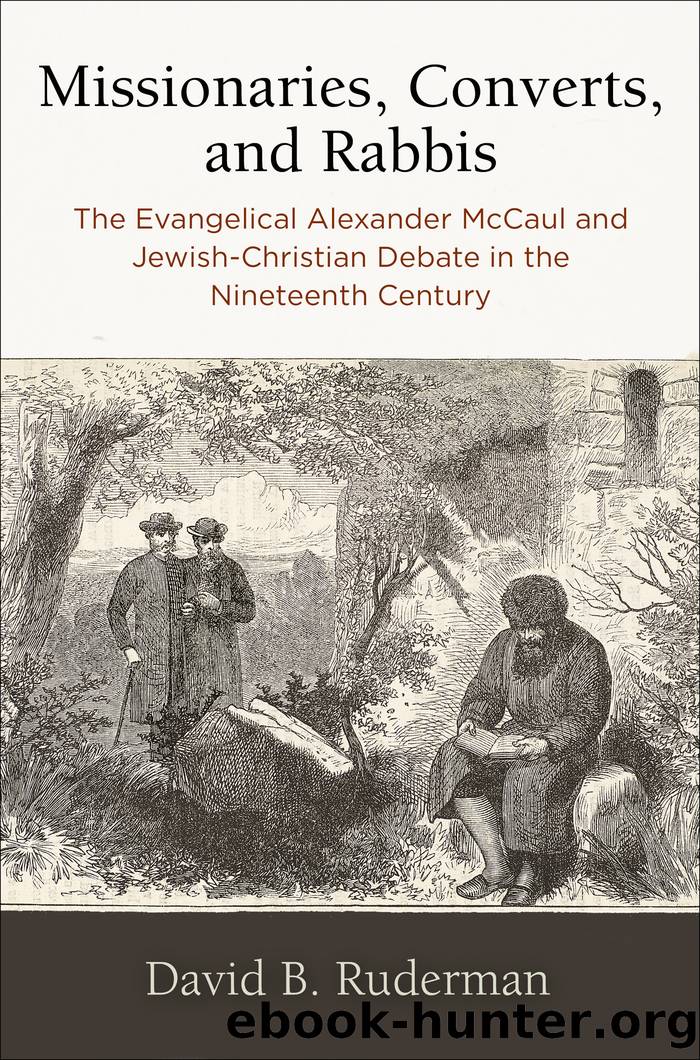Missionaries, Converts, and Rabbis by David B. Ruderman

Author:David B. Ruderman
Language: eng
Format: epub
Publisher: University of Pennsylvania Press, Inc.
Published: 2020-03-15T00:00:00+00:00
There is nothing subtle or hidden about Margoliouthâs unflattering portrait of the hypocritical Alslop who professes Christian charity through his âfriends of Israelâ association while speaking ill of all converts who allegedly retain their Jewish markings even after their baptism and ordination. Nor does the noble Dr. Radcliffe hold back in his condemnation of the same âfriendsâ who turned out to be the worst enemies of the convert Monteleone. Anyone reading this work in 1860 would realize instantaneously that the author was speaking about his so-called âfriendsâ associated especially with the London Society and their futile and cynical attempts to convert vulnerable Jews, to present them as learned and able missionaries, and then to question and undermine their status as Christians in the first place. No doubt Margoliouth in these depictions was speaking from experience and referring explicitly to the kind of ugly relations with certain Christians that had plagued his entire career in the church. Consider one example, by way of comparison: the aforementioned case of Charles Burney, the vicar of Halstead, one of Margoliouthâs chief tormentors, whom Margoliouth had labeled âmy deadliest enemy and [who] has persecuted me for the last two years with a perseverance of which a Herod or a Nero would be proud.â When Burney made his unsubstantiated accusations against him, âa few of the so-called âfriends of Israelâ not only gladly believed the accusation but cheerfully repeated the same.â56
The novel concludes, however, on a more positive and hopeful note as most of the principals congregate at the home of Dr. Radcliffe and his wife for a dinner party. Margoliouth had already introduced the mysterious but beautiful mother of the young Monteleone who, along with her son, was an honored guest of the evening. Dutton, a young Christian student mentored by Monteleone, was asked to present what he had learned from his gifted teacher and proceeds to offer a competent oration on Hebrew sacred music to the sympathetic guests in attendance. Monteleone eventually takes over the lecture, tracing the history of ancient Hebrew music from the biblical Yuval to the end of the Babylonian captivity with vast erudition and eloquence. In the course of his remarks, Monteleone explicitly referred to a list of authorities on Jewish music, including the Jews Abraham Ha-Cohen of Zante (1670â1729), Moses Mendelssohn (1729â86), and Leopold Zunz (1794â1886), along with the Christians Martin Luther (1483â1546), Immanuel Tremellius (1510â80), Myles Coverdale (1488â1569), and Ernst Wilhelm Hengstenberg (1802â69). The evening concludes with the recital of a Hebrew hymn by both mother and son followed by a solo performance of an Aramaic hymn by the mother. We have already noted Margoliouthâs infatuation with Jewish liturgy, Hebrew poetry, and music, evidenced in his travelogue as well as in his scholarly publications. If there could be any doubt about the striking resemblance between Monteleone and Margoliouth beforehand, the formerâs allocution on the music of the Hebrews leaves no doubt at all that the character of Monteleone was created to articulate the authorâs ultimate concerns. With this moving scene, the first volume of a supposedly longer but unfinished work abruptly comes to an end.
Download
This site does not store any files on its server. We only index and link to content provided by other sites. Please contact the content providers to delete copyright contents if any and email us, we'll remove relevant links or contents immediately.
Einstein: His Life and Universe by Walter Isaacson(1312)
Finding Freedom: Harry and Meghan and the Making of a Modern Royal Family by Omid Scobie & Carolyn Durand(1174)
Promised Land (9781524763183) by Obama Barack(1153)
Compromised by Peter Strzok(1068)
Finding Freedom by Omid Scobie(1060)
JFK by Fredrik Logevall(992)
Freedom by Sebastian Junger(630)
Salford Lads: The Rise and Fall of Paul Massey by Bernard O'Mahoney(577)
The Russia House by John Le Carré(563)
Kremlin Winter by Robert Service(527)
Day of the Dead by Mark Roberts(514)
A World Ablaze by Craig Harline(505)
Graveyard (Ed & Lorraine Warren Book 1) by Ed Warren & Lorraine Warren & Robert David Chase(503)
Flying Tiger by Samson Jack(501)
Joe Biden: American Dreamer by Evan Osnos(491)
100 Things Successful Leaders Do by Nigel Cumberland(478)
Melania and Me: The Rise and Fall of My Friendship With the First Lady by Stephanie Winston Wolkoff(476)
The Irish Buddhist by Alicia Turner(470)
The Mission by David W. Brown(459)
